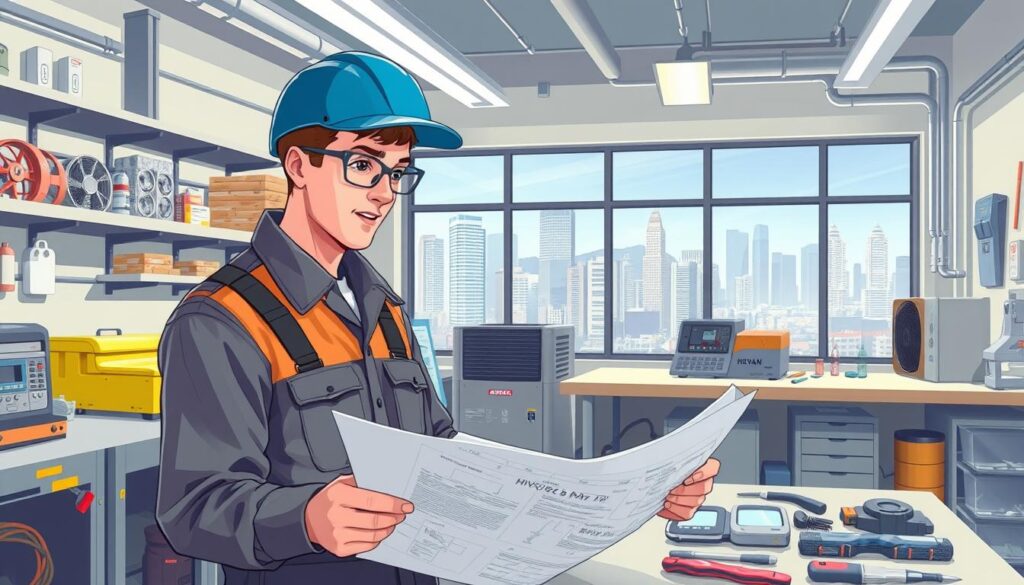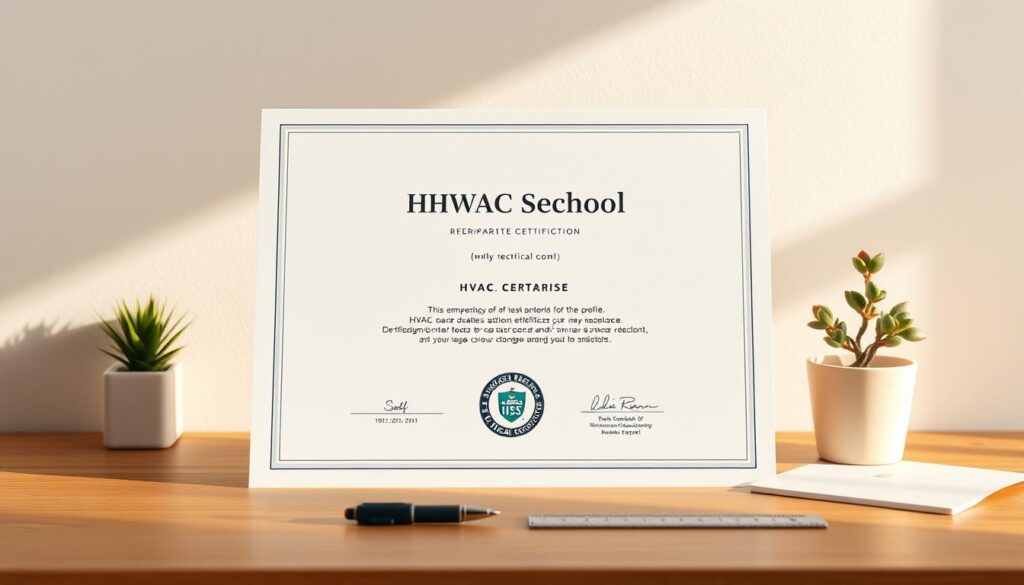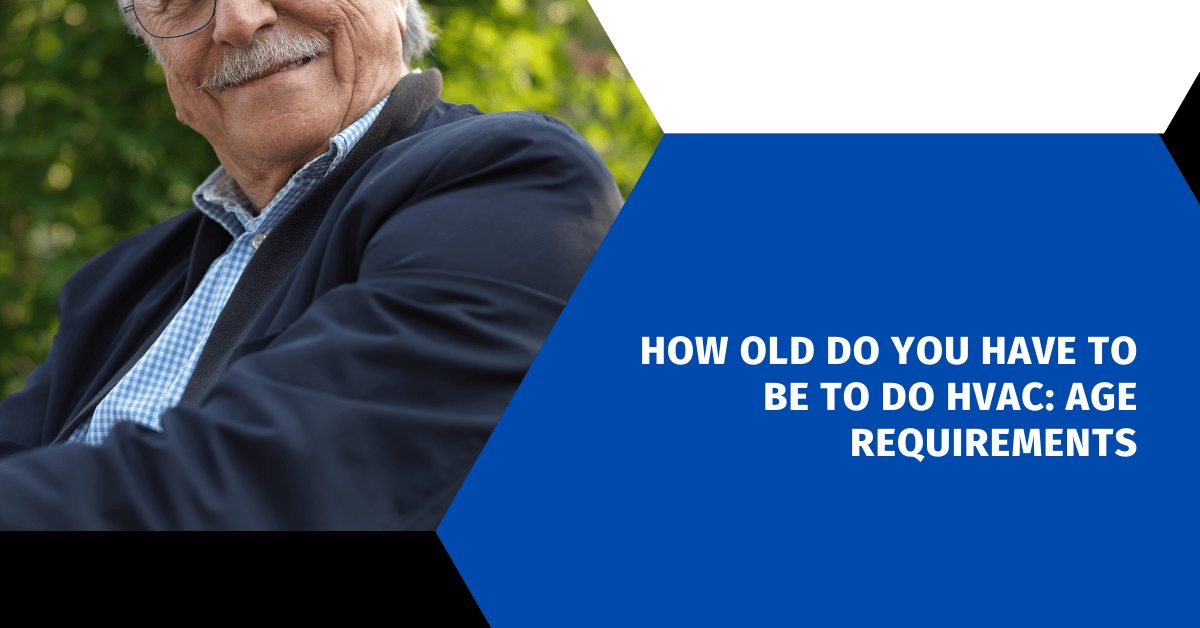Affiliate Disclosure
HVAC Guide Guys is a participant in the Amazon Services LLC Associates Program, an affiliate advertising program designed to provide a means for sites to earn advertising fees by advertising and linking to Amazon.
How Old Do You Have to Be to Do HVAC? Are you wondering if your age could stop you from starting an HVAC career? The HVAC field is full of chances for people of all ages. But, knowing the age rules is key to your career path.

Looking into HVAC age rules, you’ll see they change a lot. Each state, school, and job path has its own rules for HVAC techs.
Your love for technical work and eagerness to learn are more important than your age. HVAC age rules are set to keep everyone safe, skilled, and ready for the job.
Key Takeaways
- HVAC careers welcome individuals from diverse age backgrounds
- Minimum age requirements typically range between 16-18 years old
- Educational paths and apprenticeships offer flexible entry options
- Physical fitness and technical aptitude matter more than age
- Military and vocational programs provide alternative career entry routes
Table of Contents
Understanding HVAC Career Path Basics
An HVAC career is exciting for those who love technical skills and hands-on work. To become an HVAC technician, you need to know about heating, ventilation, and air conditioning systems. Even if you’re young, you can start a rewarding career with lots of growth opportunities.
HVAC work is all about making buildings comfortable and working well. As a technician, you’ll install, maintain, and fix complex systems in homes, offices, and factories.
What HVAC Professionals Do
- Install heating and cooling systems
- Diagnose mechanical problems
- Perform regular system maintenance
- Read and interpret technical diagrams
- Ensure energy efficiency
Career Growth Opportunities
The hvac career minimum age is usually 18, but you can start growing your career right away. With skills, you can move up from entry-level to roles like:
- HVAC Service Technician
- Installation Specialist
- Maintenance Supervisor
- Systems Designer
- Business Owner
Industry Outlook
The HVAC industry is growing fast, thanks to new tech and the need for energy-saving solutions. If you keep learning and improving your skills, you’ll have job security and good pay.
How Old Do You Have to Be to Do HVAC
Knowing the legal age for HVAC work is key for those starting out. Most HVAC jobs need you to be at least 18. This age makes sure workers are mature and strong enough for the job’s technical tasks.
Starting your HVAC career depends on a few important things:
- State-specific labor regulations
- Type of HVAC work (apprenticeship vs. certified technician)
- Educational background
- Physical and mental preparedness
While 18 is the usual age limit for HVAC jobs, you can start early. You can prepare by:
- High school vocational programs
- Technical education courses
- Shadowing experienced technicians
- Participating in pre-apprenticeship training
Some states let 16 and 17-year-olds work in HVAC under close watch. These chances let young people get real-world experience and learn industry rules. Apprenticeships are great for those starting young in HVAC.
Your hard work and eagerness to learn can really help you get into HVAC. Look into local laws and get advice from HVAC experts to understand age rules better.
Explore Our HVAC Shop
Looking for top-rated HVAC tools, parts, and accessories? Visit our shop and find the perfect solution for your needs.
Visit the ShopLegal Requirements for HVAC Technicians
Understanding the legal rules for HVAC jobs can be tricky. It’s key for those starting in this field to know the laws.
Looking at the minimum age for HVAC certification, several laws apply. These laws vary by state and federal rules, affecting young workers in HVAC.
State-Specific Age Regulations
Every state has its own rules for HVAC technician ages. These rules aim to protect young workers and ensure they get the right training and safety.
- Minimum working age varies by state
- Some states require special work permits
- Age restrictions differ for apprenticeship programs
Federal Labor Laws
The Fair Labor Standards Act (FLSA) is a big deal for young workers. It sets age limits and work rules for those under 18.
| Age Group | Work Restrictions | Training Limitations |
|---|---|---|
| 14-15 years | Limited non-hazardous work | Restricted hands-on training |
| 16-17 years | More flexible work options | Supervised technical training |
| 18+ years | Full job access | Unrestricted professional training |
Work Permit Requirements
Many states need work permits for minors in technical jobs. These permits make sure young workers are supervised and meet school rules.
- Parental consent often required
- School documentation needed
- Regular permit renewals
Knowing these laws helps young people enter the HVAC world safely and legally.
Educational Prerequisites for HVAC Training
Starting a career in HVAC requires knowing the basic education needed. Your path begins with a strong academic base. This prepares you for technical training in heating, ventilation, and air conditioning.
HVAC training has age and education requirements. Most employers and training programs look for:
- A high school diploma or equivalent GED
- Strong mathematical skills
- Basic understanding of science and physics
- Minimum age of 18 for most professional training programs
Academic preparation is key for HVAC technicians. In high school, take courses that strengthen your technical skills:
- Mathematics (algebra, geometry)
- Physics
- Computer technology
- Technical drawing
“Education is the passport to your future HVAC career” – Industry Training Expert
Your education affects your ability to start HVAC training. Technical schools and community colleges offer programs. They help bridge classroom learning to real-world HVAC skills.
Many schools offer flexible learning options. This ensures motivated people can start their HVAC career, no matter their current education level.
HVAC Apprenticeship Age Requirements
Exploring HVAC apprenticeship opportunities means knowing the age needs and program setups. Your entry into this exciting career depends on meeting certain criteria. These criteria vary among different apprenticeship programs.
The typical age for HVAC apprenticeship is between 18 and 21 years old. Most programs have age limits. This ensures participants are mature and physically ready for technical training.
Traditional Apprenticeship Programs
Traditional HVAC apprenticeship programs offer clear paths for future technicians. These programs include:
- Classroom instruction
- Hands-on technical training
- Supervised work experience
Union vs Non-Union Programs
HVAC apprenticeship options vary between union and non-union programs:
- Union Programs: More structured with set training
- Non-Union Programs: More flexible with entry rules
Duration and Commitment
HVAC apprenticeships require a big time commitment. Most last 3-5 years, needing:
- 2,000 hours of on-the-job training each year
- 144 hours of technical education yearly
Your dedication to learning and skill development is key to success in HVAC apprenticeship. Knowing age requirements and program expectations prepares you for a fulfilling technical career.
Explore Our HVAC Shop
Looking for top-rated HVAC tools, parts, and accessories? Visit our shop and find the perfect solution for your needs.
Visit the ShopTechnical School and Certification Requirements

To become an HVAC professional, you need more than just technical skills. Your path to becoming an HVAC technician includes specific educational and certification needs. These can change based on your age and where you live.
Technical schools are key in preparing you for an HVAC career. Most programs accept students who are at least 16-18 years old. This makes it a great choice for young adults starting their HVAC career journey. These schools provide detailed training that covers important skills and knowledge for the HVAC field.
- Minimum age requirements typically range from 16-18 years
- Programs offer both classroom instruction and hands-on training
- Certifications validate your technical expertise
Certification is a big step in your HVAC career. The most recognized credentials include:
- EPA Section 608 Certification
- NATE (North American Technician Excellence) Certification
- State-specific HVAC licenses
Pro tip: Start exploring technical school options early to understand the age requirements and prepare for your future HVAC career.
Investing in your education and certifications is key to becoming a successful HVAC professional.
Your journey to become an HVAC professional starts with the right technical program and necessary certifications. Look into local schools, understand their specific needs, and begin your path to a rewarding HVAC career.
Physical and Mental Requirements for HVAC Work
HVAC jobs are not just about age. They require certain physical and mental skills. These are key for success and safety. Young professionals need to know the full range of requirements for HVAC work.
Demanding Physical Challenges
HVAC technicians face tough physical tasks. They need to be strong and have lots of endurance. Your job will include:
- Lifting heavy equipment weighing up to 50-70 pounds
- Working in cramped spaces like attics and crawl spaces
- Standing, climbing, and moving all day
- Doing precise tasks that need great hand-eye coordination
Safety Considerations
Safety is a big part of HVAC jobs. Technicians must show:
- Strong risk assessment skills
- Ability to follow complex safety rules
- Mental sharpness in risky environments
- Quick thinking under pressure
Having good judgment is key when working with electrical systems and handling refrigerants. Your mental and physical health greatly affect your work in HVAC.
Starting Your HVAC Career as a Young Adult
Starting an HVAC career as a young adult needs careful planning and early steps. Knowing how old you must be to start is key. Most entry-level jobs and apprenticeships are open to those 18 to 22 years old. This is a great time to begin your career.
To start your HVAC technician journey, take action in high school and early adulthood. Here are steps to get you started:
- Take math and physics classes
- Join technical education programs
- Look for local apprenticeships
- Get a high school diploma or GED
When figuring out how old you must be to start in HVAC, remember age rules vary. Most employers want candidates who are at least 18 and have a good education. Some schools offer HVAC programs that can help you stand out in the job market.
Networking is key to starting your HVAC career. Go to industry events, meet local HVAC pros, and find mentors. These connections can give you insights and job leads.
“The best time to start your HVAC career is now. Preparation and passion are your greatest assets.” – HVAC Industry Professional
Think about money too. Many apprenticeships pay you while you learn. Look for scholarships and grants to help with school costs.
Explore Our HVAC Shop
Looking for top-rated HVAC tools, parts, and accessories? Visit our shop and find the perfect solution for your needs.
Visit the ShopMilitary Path to HVAC Careers
Exploring a career in HVAC through military service is a unique and compelling option. It offers a chance to gain professional HVAC skills while serving your country. The U.S. military provides exceptional opportunities for those interested in technical trades.

The military has a structured approach to learning HVAC skills. To qualify for military HVAC training, you must be between 17 and 42 years old. This age range allows for significant flexibility in career development.
Military HVAC Training Qualifications
To enter military HVAC training, you’ll need to meet several key requirements:
- Pass the Armed Services Vocational Aptitude Battery (ASVAB) test
- Meet physical fitness standards
- Obtain a qualifying score in technical aptitude sections
Benefits of Military HVAC Experience
Military HVAC training offers substantial advantages for your career trajectory:
- Comprehensive technical training
- Hands-on experience with advanced equipment
- Potential for educational benefits and certifications
| Military Branch | HVAC Training Options | Age Requirement |
|---|---|---|
| Army | Heating/Cooling Specialist | 17-35 years |
| Air Force | Environmental Systems Technician | 17-39 years |
| Navy | Refrigeration Specialist | 17-39 years |
The military provides an exceptional platform for launching your HVAC career. It combines structured training with real-world experience. By leveraging military HVAC age requirements, you can transform your professional aspirations into a rewarding technical career.
Career Advancement and Age Considerations
Your HVAC career is a journey of growth and opportunity. The minimum age to start is just the beginning. Your true success depends on your skills and commitment.
To move up in the HVAC industry, you need a plan and ongoing learning. Young professionals can speed up their career by focusing on a few key areas:
- Specialized technical certifications
- Advanced training programs
- Professional networking
- Hands-on experience
Here’s how your HVAC career usually grows:
- Entry-level technician
- Skilled technician
- Senior technician
- Technical supervisor
- Management positions
Starting age is just the first step. To succeed, you must keep learning and stay current with new tech and trends. Skills like problem-solving, customer service, and technical know-how are more important than age as you climb the ladder.
“Success in HVAC is about skills, dedication, and adaptability, not just years of experience.” – HVAC Industry Expert
Companies look for reliable, skilled, and growing technicians. By improving your skills and staying proactive, you can build a fulfilling HVAC career.
Explore Our HVAC Shop
Looking for top-rated HVAC tools, parts, and accessories? Visit our shop and find the perfect solution for your needs.
Visit the ShopAlternative Entry Paths for Different Age Groups
Looking into hvac training age requirements shows many ways to start a career in HVAC. It doesn’t matter if you’re in high school or an adult looking for a new job. The HVAC field has lots of chances for growth.
The HVAC industry is open to people of all ages and backgrounds. It knows that starting a career can happen at any time. So, many programs have been created to help those who want to become technicians.
High School Jumpstart Programs
Students in high school can start their HVAC journey early:
- Vocational training programs
- Dual enrollment technical courses
- Career and technical education (CTE) pathways
- Summer internship opportunities
Adult Education and Career Transition Options
Adults looking into hvac training age requirements have many flexible options:
- Community college certificate programs
- Online accelerated training courses
- Evening and weekend technical classes
- Employer-sponsored training initiatives
Key takeaway: Your age should never stop you from starting a career in HVAC. With the right drive and training, you can succeed at any age.
Conclusion
Knowing how old you need to be to start in HVAC is key for those interested in this field. The HVAC industry has many opportunities for people of all ages. Most jobs require you to be at least 18 years old.
You can start early through high school programs, vocational training, or apprenticeships. This sets the stage for a career in HVAC.
It’s important to do your research on HVAC careers. Each state has its own rules and requirements. Make sure you know what’s needed in your area.
Technical schools, community colleges, and trade programs are great places to start. They help you build a strong foundation in HVAC.
Your passion and dedication are more important than your age in HVAC. Whether you’re in high school, just graduated, or looking for a new career, there are many ways to begin. Getting the right training, certifications, and skills will help you succeed.
An HVAC career can be stable, well-paying, and always growing. By understanding age requirements and preparing well, you can turn your interest into a fulfilling career. This career offers long-term growth and satisfaction.

